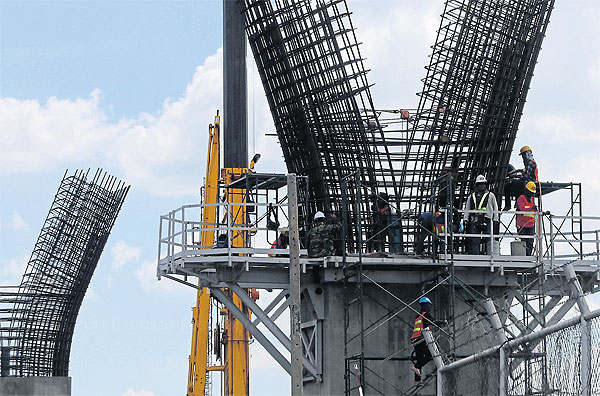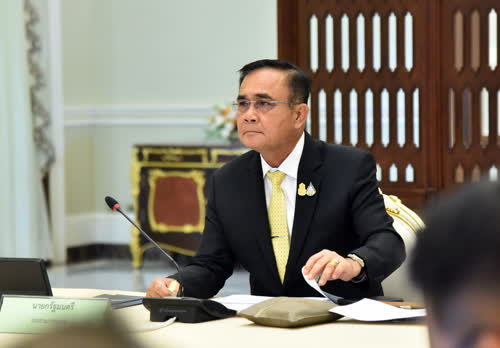The construction market has slowed considerably in Yangon over the past year but developers hope that good times for the industry will return under the new government.
When the Union Solidarity and Development Party first took power, development boomed, with high-rises, flyovers, bridges and luxury condominiums built at speed, fuelled by both foreign and local investment.
For the past year supply has caught up with or exceeded demand, and the market has slowed, though many are hoping that the lull is temporary.
The new government will be able to capitalise on the positive international interest the country is receiving, its fast-growing economy, its favourable geographic position and its abundant natural and human resources, said Daphne Teo, director of Uni Global Power.
“Such opportunities do not exist forever, however, and we hope the government can help Myanmar achieve its true potential with forward-thinking, well-considered policies to promote business and investment,” she said.
Experience in other countries indicates that local-foreign joint ventures are a good way forward, she told The Myanmar Times in a recent interview. Her Singapore-based company is the majority owner of a high-end residential project in Yangon called Golden City.
“We hope to see extensive engagement with the international community to see how we can smooth foreign-local partnerships for the betterment of Myanmar.”
Despite the opportunities, concerns remain about the difficulty of doing business. The World Bank recently ranked Myanmar 167th globally in terms of ease of doing business. While this is an improvement over earlier rankings, there is clearly huge scope for further progress.
Much must be done to simplify regulations, introduce clarifying laws such as the Condominium Law, and provide reasonable investor protections, added Ms Teo.
“We expect the incoming government will make strong efforts in this area. As Singaporeans, we have seen first-hand how a stable government working towards economic development, promoting foreign investment, and creating a business-friendly climate can transform a country from third-world to first-world in a generation,” she said.
“Today, Myanmar has more resources and better opportunities than Singapore did many decades ago, and we hope the government will capitalise on this historic moment.”
One problem frequently cited by potential investors is the poor quality of infrastructure, which endured decades of neglect under the military regime. As global companies move into to cities such as Yangon and urbanisation gathers pace, infrastructure shortfalls have become increasingly clear.
McKinsey has estimated that infrastructure construction and operations contributed around US$10.5 billion to Myanmar’s GDP in 2010. By 2030, the US management consultancy estimates that the sector’s GDP contribution could be $48.8 billion, and that the largest potential for growth and jobs until then is in real estate.
“We estimate that Myanmar will need total infrastructure investment of $320 billion between 2010 and 2030. The most significant investment needs to be in residential and commercial real estate, which could potentially comprise around 60 percent of the total requirement,” it said in a report.
Based on Singapore’s experience, Ms Teo says the government should encourage home ownership, through developing a mortgage system. This depends on progress in the banking system, land law enforcement, record-keeping, and better risk assessment, she said, adding that foreign banks could be encouraged to offer mortgages.
Secondly, it should support the Condominium Law, passed by the outgoing government, which allows foreign buyers access to the market.
“Further clarity on condos and foreign ownership will be very important to enable the construction industry – which is one of the largest in Myanmar – to continue contributing so much to the economy, by stimulating further international investor interest in Myanmar and enabling businesses to grow faster,” she said.
Extension of the law to cover build-operate-transfer developments as well as other land types would help to protect existing investor interests and promote more foreign investment, she added.
Thirdly, the government should ease restrictive measures on real estate investment, like property tax and stamp duty, and should consider collecting taxes annually instead of levying a single one-time payment, said Ms Teo, thus promoting regular income for the government.
New Minister for Construction U Win Khaing has not yet spoken publicly about his plans for the sector, though Yangon Region chief minister U Phyo Min Thein has promised that his government will clean up corruption over its five year term, particularly in regard to foreign investment.
This should be welcome news for most investors, as the outgoing chief minister, U Myint Swe – who will be a vice president in the new Union government – has been regularly criticised over the past five years for his close links to well-connected businesses and his government’s repeated transparency failures.
The non-profit Yangon Heritage Trust said in a statement last week said it looked forward to working closely with U Phyo Min Thein and his administration to make Yangon a more attractive and liveable city, with proper urban planning and conservation.
“I’m delighted that Ko Phyo Min Thein will be Yangon’s new chief minister. I am confident he will be a strong supporter of proper urban planning and conservation,” said the group’s chair, U Thant Myint-U.
“The new administration will be taking office at a pivotal moment for Myanmar’s biggest city. There are pressing issues of jobs, basic infrastructure, housing, transport, and public health as well as heritage protection that need to be urgently considered,” he said.
U Tin Maung Win, managing director of Capital Development, which won contracts for flyovers from the outgoing government and is building a large residential project in Yangon called Gems Garden Condominium, said his company expected the construction sector to flourish under the new administration.
The advent of true democracy will bring additional international investment and support, said U Sone Han, chair of First Myanmar Construction, which is developing a Secondary Central Business District in Mayangone township.
“I have a positive view of the future of construction under the new government. I foresee many projects, more foreign investment and great potential for tourism,” he said, adding that the outgoing government had done much to support the sector during the first part of the transition from military rule.
It is time to launch new projects, said Sai La Min of First Golden Dragon Construction. “This transition can only lead to further business for the construction sector,” he said.
Source: http://www.mmtimes.com/index.php/business/property-news/19813-harnessing-investment-into-yangon-s-development.html

